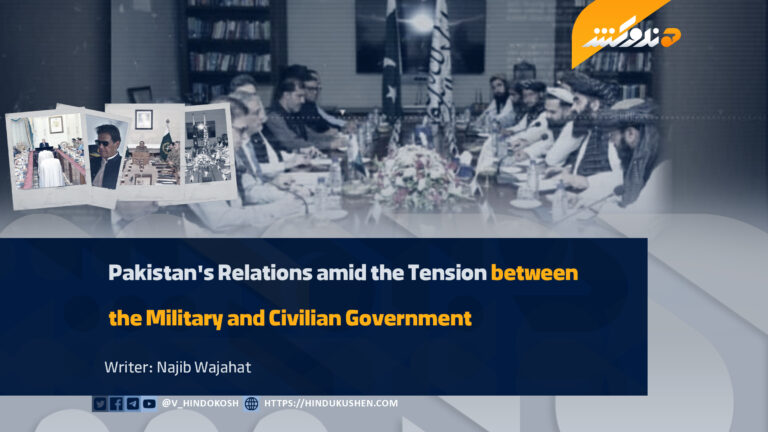Writer: Najib Wajahat
Due to its geographical location, historical background, and strategic considerations, Pakistan has always remained an important neighbor for Afghanistan. The two parallel decision-making axs of the country itself, “the military and the civilian government,” have occasionally been subject to conflict and tension in relations with Afghanistan. However, a major problem in the country’s political structure is that foreign policy decisions are not solely in the hands of the civilian government, but the military and intelligence (ISI) also have significant authority in this area. Due to this very contradiction, relations between Afghanistan and Pakistan have always been plagued by mistrust and conflict.
In the structure of Pakistan, the military considers itself the main axis of the state’s foundation. Since 1958, the military has staged several open coups and overthrown civilian governments. Due to these experiences, the military in Pakistan’s political culture acts like a parallel government.
The geography and politics of Afghanistan are of vital importance to Pakistan. The military is trying to use Afghanistan as a strategic depth, but civilian leaders often talk about trade, transit, and political cooperation.
Civilian governments in Islamabad generally try to advance the process of normalizing trade, political, and social relations with Afghanistan. Their opinion is that for long-term stability, the space for bilateral relations must be built on trust. Civilian government officials are generally compelled to take steps toward peace and cooperation with Kabul due to economic interests and international pressure.
On the other hand, the Pakistani military is considered the biggest decision-maker in foreign policy. Following its deep strategy toward Afghanistan, the military supports groups that oppose the central government of Afghanistan. In this regard, the army regularly holds meetings, encourages armed opponents, and supports them in their fight against the governments of Afghanistan. The military’s goal thru this policy is to maintain sustained influence in Afghanistan’s affairs and secure strategic depth for itself.
The civilian government wants to normalize relations thru diplomatic trips, official visits, and trade agreements, but the military is trying to keep Afghanistan under its agenda by creating insecurity, funding the opposition, and exerting pressure. They are using armed groups to put pressure on the Afghan government and keep Afghanistan unstable for their strategic goals. This dual approach has caused Afghanistan to never develop a sense of trust toward Pakistan.
This two-sided contradiction has practically led to Pakistan being recognized as a country with a dual-faced and two-faced approach rather than a unified policy. Foreign observers consider Pakistan a country plagued by civil-military relations. According to the international community, as long as the military continues its hidden agendas for the war in the region, Pakistan’s civilian government can not establish long-term, trust-based relations with Afghanistan.
On one hand, the Pakistani army seeks international support against terrorism, but on the other hand, it maintains its influence by supporting armed groups in the region. This dual policy is clearly visible against Afghanistan, and there is also documented evidence that Pakistani intelligence circles are using ISIS as a tool of pressure in the region. The goal is to increase instability within Afghanistan and put pressure on the Afghan government.
In the past four years, the Pakistani army has attempted to support opposition groups in Afghanistan and then falsely accuse the Afghan government of supporting opposition groups in Pakistan. This is part of the policy of maintaining influence and strategic depth, from which Pakistan has never deviated.
The conflict between Pakistan’s civilian government and military has caused the country’s relations with Afghanistan to always be fraught with disputes, mistrust, and contradictions. Until full control of foreign policy in Pakistan is consolidated in the hands of the civilian government and the military separates the war project from politics, relations between Afghanistan and Pakistan will be subject to political games and tactical gains rather than genuine friendship.
Note: The articles, essays, and comments published by the Voice of Hindukush only reflect the views of the authors & writers and do not necessarily represent the agreement of the Voice of Hindukush.




